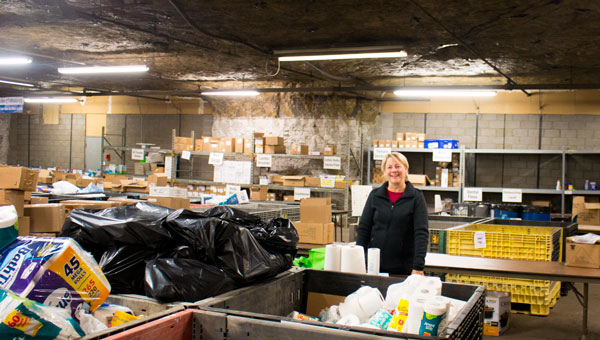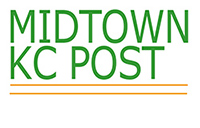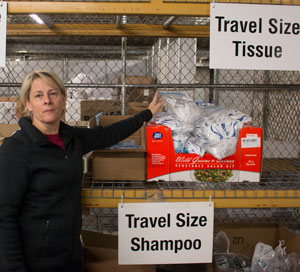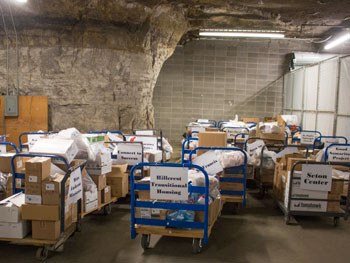 Way underground in the 31st Street caves, Teresa Hamilton is surrounded by some of the most basic items she thinks people need but can’t buy using government assistance. Things like soap, shampoo, deodorant, toothpaste, laundry detergent and feminine hygiene products.
Way underground in the 31st Street caves, Teresa Hamilton is surrounded by some of the most basic items she thinks people need but can’t buy using government assistance. Things like soap, shampoo, deodorant, toothpaste, laundry detergent and feminine hygiene products.
Her nonprofit, Giving the Basics, has become a hub for local folks who need such products, pantries that can distribute them, and Kansas City area businesses who can supply goods and volunteers.
Hamilton began Giving the Basics in 2011 after she got a call from a single mother raising six kids.
“She was literally begging for me to help her with help buying toilet paper” she said.
Hamilton asked the women why she didn’t use her government assistance card, and the woman said it rejected lots of items she really needed. While she was able to get food, she said her teenage daughters sometimes had to stay home because they couldn’t get grooming essentials.
Hamilton thought it would be really hard for those teenage girls, or anyone, to go to school, look for a job or feel good about themselves without being able to be clean.
So she helped the woman get those items for ten months until she got a job and got back on her feet. At the same time, Hamilton investigated the problem and decided access to these types of items was a problem nationwide.
“Giving the Basics choose me, I didn’t choose it,” she said.
“Not having the most basic items to get clean immediately creates a distance and difference between people. If some people can get clean and other can’t, there is no way to level the playing field to allow for human dignity,” she explained.
“I could only imagine the violence and hatred that was stemming from those who can get clean and those who could not get clean. I could only imagine the illnesses that could be prevented if people could get clean. I could only imagine the pain in the families and the shame for not being able to help your children succeed and make friends and not be bullied because you could not provide what they needed to smell good and be fresh and ready to learn. I knew women could be held down if they couldn’t get clean.”
Hamilton thought such a problem required a change at every level, so she set about creating a “hygiene distribution system.”
She formed a board and began helping companies have drives to gather grooming items. At first she stored them in her garage. In 2011, she moved to the “caves,” the underground warehouse space at 1501 W. 31st.
The hygiene hub model Hamilton has orchestrated all comes together in the 31st Street underground space. Hygiene products collected at company drives or donated directly are sorted in the warehouse. Volunteers come to Midtown to sort and bag the products. Once a month, local pantries and shelters come to the caves to pick up items, which they then distribute to their clients.
GivingThe Basics now serves 181 distribution sites, including 10 school districts and more than 55 local pantries.
“We are now able to impact over 23,000 local people monthly with human dignity and personal hygiene products,” Hamilton says.
She’s looking for more help from local folks, such as product donations and direct connections to manufacturers so they can get involved and help Giving the Basics get more products. Hamilton also wants to find more companies, individuals and foundations to make financial donations and more businesses, individuals and groups to volunteer.
Giving the Basics has now gotten interest from almost every state in getting involved in the program. Hamilton believes Kansas City has created a model that can work in any city.





Who’s talking